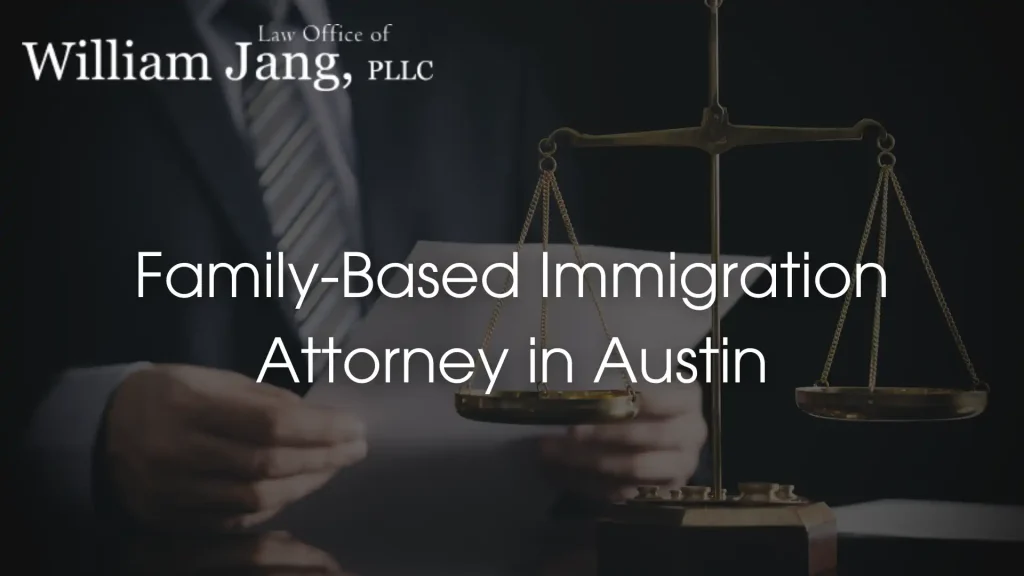
The application process for family-based immigration visas can become exceedingly complicated for people who simply want to be with their family members who are living in the United States. Unfortunately, many people are denied entry into the U.S. as the result of an administrative error that could have been avoided with the help of an experience attorney.
At the Law Office of William Jang, PLLC, our Austin family-based immigration attorneys understand the complexities involved in the application processes for each of the family-based immigration visas. That being said, our legal team in Austin is prepared to help you and your family work through all the paperwork that will be required of you to complete each of your applications.
Options for Family-Based Immigration
The United States offers many family members of its citizens and permanent residents the ability to move here permanently. However, that does not mean that the country treats all family members and applicants equally. United States Citizenship and Immigration Services (USCIS) has set preferences for certain relationships. Knowing exactly how USCIS sees your relationship and what priority it puts on your application is a critical part of how you approach the application process. For family members of United States citizens and permanent residents, family-based immigration visa options include:
- IR – Special Priority Visas for Immediate Relatives:
- The spouse of a United States citizen: If you are married to a United States citizen, you have the right to join your spouse through the green card process. Spouses will spend two years with conditional permanent residency before getting those conditions removed. There are no caps on the number of visas for spouses.
- The children of a United States citizen: Children of a United States citizen who are unmarried and under the age of 21 can receive a green card. There are no caps placed on these visas.
- The parents of a United States citizen: If the United States citizen is over 21, their parents can qualify for a special priority visa. There are no caps on these visas.
- FB1 – Family First Preference Immigration:
- The unmarried children over 21 of a United States citizen: All children who are over 21 and unmarried are eligible for a first preference green card. However, there is a cap of 23,400 visas per year for this category, and there is often a long wait associated with this category. Once a child has immigrated, their child (who are under 21 and unmarried) may be eligible for a visa as well.
- FB2 – Family Second Preference Immigration:
- The spouse of permanent resident: Unlike the spouses of United States citizens, the spouses of permanent residents do not receive special priority. There are 114,200 visas available each year for second preference immigration and a possible wait of three years.
- The children of a permanent resident: Similar to the spouses of permanent residents, children also do not get access to the unlimited visas for special priority cases. Instead, they too must get visas among the 114,200 allotted per year. Children must be under 21 and unmarried.
- The children over 21 of a permanent resident: Children who are over 21 can also join the pool of applicants, but their portion of the 114,200 visas is significantly smaller, making their wait substantially longer (usually about eight years).
- FB3 – Family Third Preference Immigration:
- The married sons and daughters of a United States citizen: This category allows the married children of a United States citizen to immigrate to America. The children must be over 21 years old. There are only 23,400 visas provided each year in this category, and the wait can be around nine to ten years. Spouses and children can immigrate with the sponsored child.
- FB4 – Family Fourth Preference Immigration:
- The siblings of a United States citizen: The final category provides green cards for siblings of United States citizens. The sibling must be over 21 years old. There are 65,000 available green cards per year, and the wait is often ten to 11 years.
Whatever category you and your family fit into, the Law Office of William Jang, PLLC can help you approach the application process successfully and avoid extra green card delays.
Choose the Law Office of William Jang, PLLC for Help
 When you are looking for an immigration attorney to help you, you are often wondering, “What should I look for in a lawyer?” and “How do I know if a firm can handle my case?” The attorneys of the Law Office of William Jang, PLLC have been the trusted choice for so many people who have decided to settle in this area and make Austin their home.
When you are looking for an immigration attorney to help you, you are often wondering, “What should I look for in a lawyer?” and “How do I know if a firm can handle my case?” The attorneys of the Law Office of William Jang, PLLC have been the trusted choice for so many people who have decided to settle in this area and make Austin their home.
What sets us apart from the rest is our unwavering dedication to our clients. We are willing to go the extra mile for each of our clients. We know that each family that we help has a unique situation and needs, and we take a catered approach to each client and their particular situation. Our attorneys have decades of combined experience, and we understand how it important it is for families to stay together. Unfortunately, many people are denied entry into the United States due to simple clerical errors and the result can be devastating for the individual and their family.
Our goal is to assist you with any and all of your legal needs when it comes to your immigration status. Our attorneys know all pitfalls that people encounter that could delay your application, and we are here to ensure that you do not fall victim to simple mistakes in the form.
Whichever family-based immigration visa you are applying for, our attorneys are willing to help each of your family members through each step of the way. We can help you determine which option is best for you and your family to ensure that you remain together or are finally reunited. Find us on Google Maps and read reviews from people we’ve helped.
Frequently Asked Questions about Family-Based Immigration
What is a sponsor?
The United States Citizenship and Immigration Services (USCIS) considers a sponsor to be a person who lives in the United States legally. The sponsor can file petitions to bring family members into the United States. Depending on the relationship, this includes petitions for family members to obtain a green card, fiancé visa, or a K-3/K-4 visa. The different types of visas can be confusing, but our attorneys can help you decide what is best for your family depending on your situation.
Who qualifies as an immediate relative?
An immediate relative is an unmarried minor, child, or spouse of a permanent United States citizen. If a child is petitioning for a parent, the child must be over the age of 21. Siblings, married children, and both unmarried and married adult children do not qualify as an immediate relative.
I filled for a petition for a relative when I was a permanent resident but have since been awarded United States citizenship. What happens now?
Under the laws and regulations in place by the USCIS, when you become a U.S. citizen, your spouse and any unmarried children under the age of 21 will have visas immediately upon the date your citizenship is granted and they will no longer need to wait. However, if you are sponsoring a relative, you can also upgrade their visa classification to advance the process by notifying the agency of your naturalization.
What are common mistakes when applying for family-based immigration?
The paperwork for family-based immigration cases can be very complicated and confusing due to the specific and technical language used in the application. If English is not your first language, it can be easy to commit a common mistake that could have a negative impact on your application and with the high demand of family-based immigrant visas, you do not want your family members to be left on the waiting list due to an avoidable mistake. An example of a typical simple mistake is failing to include all names used such as birth name, maiden name, and other names used.
What is the typical wait time for a visa?
Each visa will have different wait time requirements. However, employment-based immigration visas are often granted more quickly than family-based immigration visas because there are fewer applicants and employers are required to give a very detailed amount of information regarding the application before the process begins. For family-based immigration cases, unfortunately, there is a set number of immigrant visas allotted each year, and there are often way more applicants than visas available.
There are caps on the amount of family-based visas available for each country. Consequently, countries like Mexico, China, and the Philippines will experience longer wait times than citizens of other countries. Therefore, it is crucial to make sure fill out applications correctly the first time to ensure that there are no unnecessary delays. Once your relationship is established and proven in relation to the person or persons you are sponsoring, your family member is placed in line with other applicants waiting for a visa approval.
Statics of Family-Based Immigration in the United States
According to an annual report by the U.S. State Department, a shockingly high number of registrants are on the waiting list compared to the number of admitted persons to the United States. The per-country limit for registrants to enter from each country is 25,620 with a total of 226,000 family-sponsored preferences and no more than 140,000 employment-based preferences for the 2017 fiscal year. Key findings from the report include:
- Mexico has the highest number of applications with a total of 1,309,282
- The second highest number of applications comes from the Philippines with a total of 387,323 applications.
- There are 4,367,052 applications in total on the waiting list.
With the high number of applicants being subject to the waiting list, it is essential to ensure that you are doing everything you can to speed up the process. Our attorneys can work for your families so that your family members are not left on the waiting list.
Consult with a Family-Based Immigration Lawyer in Austin
If you would like to learn more about what options may available to you under the various family-based immigration visas, you should consult with one of the Austin family-based immigration attorneys at the Law Office of William Jang, PLLC, about your current circumstances. To speak with an immigration attorney in Austin about the particular visa you are interested in, please call our Austin offices at (512) 323-2333 today.








